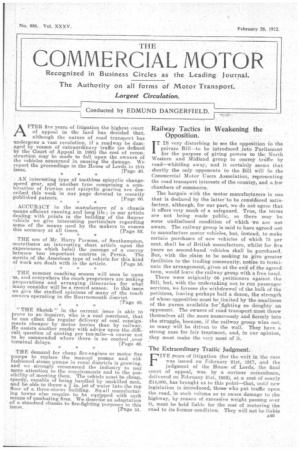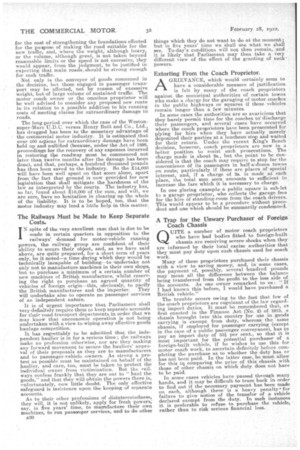Railway Tactics in Weakening the Opposition.
Page 1

Page 2

If you've noticed an error in this article please click here to report it so we can fix it.
IT IS very disturbing to see the opposition fo the private -Bill—to be introduced into Parliament for the purpose of giving powers to the North Western and Midland group to convey traffic by road—whittling away, and it certainly seems that shortly the only opponents to the Bill will he the Commercial Motor Users Association, representing the road transport interests of the country, and a few chambers of commerce.
The bargain with the motor manufacturers is one that is declared by the latterlo be considered satisfactory, although, for our part, we do not agree that it offers very much of a safeguard. True, the terms are not being made public, so there may be some undisclosed condition of which we are not' aware. The railway group is said to have agreed not to manufacture motor vehicles, but, instead, to make certain purchases of new vehicles of which 75 per cent. shall be of British manufacture, whilst for five years no second-hand vehicles shall be purchased. But, with the laim to be seeking to give greater facilities to the trading community, notice to terminate the arrangement, given at the end of the agreed term, would leave the railway group with a free hand.
• ,There were originally 66 petitioners against the Bill, 'but, with the undertaking not to run passenger services, we foresee the withdrawal of the bulk of the petitions, leaving perhaps half a dozen, the strength of whose opposition must be limited by the smallness of the purses available for'sfighting so doughty an opponent. The owners of road transport must throw themselves all the more numerously and fiercely into the struggle, because, if the railway group wins out, so many will be driven to the wall. They have a strong case for fair treatment, and, in our opinion, they must make the very most of it.
The Extraordinary Traffic Judgment:.
FIVE years of litigation (for the writ in the case was issued on February 21st, 1917, and the judgment of the House of Lords, the final court of appeal, was, by a curious coincidence, delivered on February 21st, 1922), at a cost of nearly
14,000, has brought us to this point—that, until new legislation is introduced, those who put traffic upon the road, in such volume as to cause damage to the highway, by reason of excessive weight passing over it, must be held liable for the cost of restoring the read to its former condition. They will not be liable
for the cost of strengthening the foundations effected for the puepose of making the road suitable for the new traffic, and, where the weight; although heavy, or the volume, although great, is not taken beyond reasonable limits or the speed is not excessive, they would appear, from the judgment, to be justified in expecting that main roads should be strong enough for such traffic.
Not only is the conveyer of goods concerned in the decision, but those engaged in passenger transport may be affected, not by reason of excessive weight, but of large volume of sustained traffic. The motor coach owner or the omnibus proprietor will be well advised to consider any proposed new route in its relation to a possible addition to his running costs of meeting claims for extraordinary damage to roads.
The long period over which the case of the Westonsuper-Mare T.T.D.C. versus Henry Butt and Co. Ltd., has dragged has been to the monetary advant:age of the commercial motor industry. It is estimated that over 400 adions for extraordinary damage have been held up and nullified (because, under the Act of 1898, proceedings for the recovery of any expenses incurred in restoring the roadway must be commenced not later than twelve months after the damage has been done), and that, perhaps, a hundred thousand pounds has thus been saved to the industry. So the £14,000 will have been well spent on that score alone, apart from the fact that ground is now provided for new legislation that shall mitigate the harshness of the law as interpreted by the courts. The industry has, so far, found about £10,000 of the sum, and will, we are sure, have no hesitation in clearing up the whole of the liability. It is to be hoped, too, that the motor industry may lend a little help in this matter.
The Railways Must be Made to Keep Separate Costs.
IN spite of the very excellent case that is due to be made in certain quarters in opposition to the railways' demand for motor-vehicle running powers, the railway group are confident of their ability to secure their object, and, as we have said above, are quite prepared, for a short term of years only, be it noted—a time during which they would be technically incapable of building—to -undertake not only not to manufacture machines in their awn shops, but to purchase a minimum of a certain number of new machines of British manufacture, whilst reserving the right to purchase an agreed quantity of vehicles of foreignorigin--this' obviously, to pacify the British manufacturer and the importer. They will undertake also to operate no passenger services of an independent nature.
It is of urgent importance that Parliament shall very -definitely require them to keep separate accounts for their-road-transport departments in order that we may know that uneconomic operation is not being undertaken with a view to wiping away effective goods haulage competition.
It has regrettably to be admitted that the independent haulier is in for a serious time ; the railways make no profession otherwise, nor are they making any forward movement to secure the hauliers' approval of their proposals as they are to manufacturers and to passenger-vehicle owners. As strong a protest as possible must be maintained on behalf of the haulier, and. care, too, must be taken to protect the individual owner from victimization. But the rail: ways confess frankly that they are out to "haul the goods," and that they will obtain the powers there is, enfortunately, now little doubt. The only effective safeguard is insistence upon thekeeping of separate accounts.
As to their other professions of disinterestedness, they will, it is not unlikely, apply for fresh powers; say, in five years' time, to martufactuee their own machines, to run passenger services, and to do other A30 things which they do not want to do at the moment ; but in five years' time we shall see what we shall see. To-day's conditions will not then remain, and it is likely that Parliament may then take a very different view of the effect of the granting of such powers.
Extorting From the Coach Proprietor.
GRIEVANCE, which would certainly seem to have a considerable measure of justification is felt by many of the coach proprietors against the municipal authorities of certain towns who make a charge for the garaging of motor coaches in the public highways or squares if these vehicles remain longer than a few minutes.
Insome eases the authorities are so avaricious that they barely permit time for the coaches to discharge their passengers, ancl several cases have occurred where the coach proprietors have heen prosecuted for plying for hire when they have actually merely deposited their parties at a luncheon stop and waited for their return. Under the recent King's Bench decision, however, coach proprietors are now in a better position to resist such prosecutions. The charge made is about as., but the point to be Considered is that the coach may require to stop for the convenience Of its passengers in half-a-dozen towns en route, particularly if these are places of special interest, and, if a charge of 2s. is made at each place, the. total sum soon amounts to sufficient to increase the fare which it is necessary to charge.
In one glaring example a public square is sub-let ts a garage proprietor, who collects the garage fees for the hire of standing-room from the coach drivers. This would appear to be a procedure without precedent and one which should be summarily condemned.
A Trap for the Unwary Purchaser of Foreign Coach Chassis
QUITE a number of motor coach proprietors who have had bodies fitted to foreign-built chassis are receiving severe shocks when they are informed lo-y their local excise authorities that they must pay duty upon each chassis used for coach work.
Many of these proprietors purchased their chassis with a view to saving money, and, in some cases, the payment of, possibly, several hundred pounds may mean all the difference between the balance being transferred from the profit to theloss side of the accounts. As one owner remarked to us: ' If I had known this before, I would have purchased a British vehicle."
The trouble occurs owing to the fact that few of the cesach proprietors are cognizant of the law regarding import duties. It must be remembered that, as first enacted in the Finance Act (No. 2) of 1915, a chassis brought into this country for use in goods carrying is exempt from duty, whereas the same chassis, if employed for passenger carrying (except in the case of a public passenger conveyance), has to pay an import duty of 33* per cent., so that it is most important for the potential purchaser of a foreign-built vehicle, if he wishes to use this for motor coach work, to ascertain definitely before completing the purchase as to whether the duty has or has not been paid. In the latter case, he must allow for this iq comparing the price of this chassis with these of other chassis on which duty does not have to be paid.
In some cases vehicles have passed through many hands, and it may be difficult to trace back in order to find out if the necessary payment hag been made on each, although there is a heavy penalty, for failure to give notice of the transfer of a vehicle declared exempt from the duty. in such instances it is preferable to refuse to purchase the vehicle, rather than to risk serious financial loss.






























